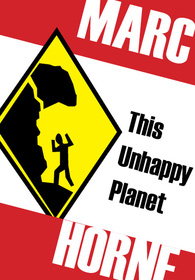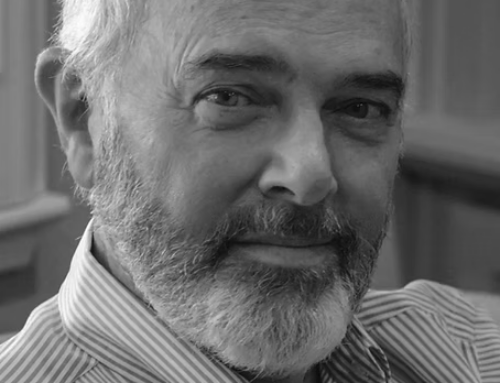 I am a huge fan of Marc Horne. And it’s not just because he’s been known to write homages to Stan Lee or name books after Morrissey songs, or even because he’s been known to say a few kind words about my own work.
I am a huge fan of Marc Horne. And it’s not just because he’s been known to write homages to Stan Lee or name books after Morrissey songs, or even because he’s been known to say a few kind words about my own work.
His new novel, This Unhappy Planet, is a satirical dramedy about two guys who hatch a scheme to open a chain of spiritual fitness clubs, hoping to get rich quick off of bored yoga moms and affluent New Age seekers. Its brilliance is in Marc’s ability to lampoon both the main characters’ cynicism as well as the distinctly SoCal brand of pseudo-spiritualism without veering into the realm of mean-spirited caricatures. The characters are imbued with such depth and shading, they are rendered so completely believable, that you can’t help but empathize with them even while laughing at their foibles.
The other thing that makes this such an enjoyable read is Marc’s natural gift for storytelling and pacing. He starts out with a slow burn, establishing a pervasive sense of impending disaster even at the very beginning. You get the uneasy feeling that the characters are too happy at the beginning, things are coming too easily and they appear to succeed more by dumb luck than by merit or virtue. Meanwhile, they know they’re full of shit, their wives know they’re full of shit and are plotting to leave them (or vice-versa), their financier is a conniving shark, their unpredictable guru has a mysterious past and a tenuous grasp on reality, and they are only ever one step ahead of being unmasked as the charlatans they are. The story moves briskly, but Marc is able to sustain that same sense of uneasiness as a counterpoint underscoring the entire narrative, building the reader’s anticipation for everything to inevitably come crashing down.
I got a chance to talk with Marc about some of the inspiration behind the novel, as well as his thoughts on independent e-book publishing and vegan Mexican food.
MM: I’m gonna start with a dumb question that I’m dying to ask… “Smokeez” is based on a real Mexican food place in San Diego, isn’t it? I ask because I think I’ve been there, and as soon as I read that scene I was like, “hey it’s that place”. I’m sure you don’t want to name the name, but it also ends with a “Z” right?
MH: I will come right out and admit that Smokeez is Pokez in Downtown San Diego. I didn’t want to name it in the book, because I was dwelling on the negatives. It’s actually a great place to eat… unless you are hungry when you arrive. But great vegan-friendly Mexican should not be rushed, right?
MM: You’ve described this as a comedy of manners set in the George W Bush years… can you expand on how much the book was informed by the post-9/11 American political and social atmosphere?
MH: There’s this concept of ‘Abundance’ that is the big driver of the book: that the Universe will provide as long as you plan and will it enough. That to me is the dominant style of the Bush administration: from WMDs to ‘they will welcome us as liberators’ to Sub-Prime mortgages. Reality is for the weak. And we see how that didn’t quite work out as planned. That’s why when I hear people in the richest place in the world talking about the abundance of the universe, I think it is not just comical but also dangerous.
MM: The book takes pleasure in lampooning a uniquely SoCal brand of pseudo spiritualism – past lives, indigo children, etc. Yet at the same time, I get the impression from your writing that you’re a pretty philosophical guy. Did you write this purely from the perspective of an outsider looking in, or is there any extent to which you identify yourself with the kind of seekers Jack and Drake are fleecing?
MH: Jack and Drake don’t really fleece anyone: they just market and package what is already going on. But I don’t identify with their target market much, despite being a Vegan hippy. I am basically a materialist, with hints of believing in quantum-induced clairvoyance. Actually, that sounds pretty SoCal, right?
MM: Compare writing and releasing this book to Tokyo Zero… how different is it self-publishing and/or e-publishing a book after the advent of the Kindle, the iPad, Feedbooks, Twitter, etc?
MH: Totally different. I wrote Tokyo Zero with the traditional publishing system in mind, but after a short while found it weird and creepy so dropped out. Then I heard about Creative Commons and dumped a PDF on my earthlink homepage and it would have probably sunk without a trace if BoingBoing hadn’t picked up on it. Still not sure who actually read a US Letter format PDF. But then Tokyo Zero got this second life about a year and a half ago with the eBook renaissance, and I became sure that book #2 was just going to go straight through the eBook channels. The fact that I could publish the book and have a hundred people reading it the day after I finished it really worked for me. Maybe Twitter has robbed me of my patience.
Also it meant that even though the book was on the short side, I didn’t feel like I needed to pad it out to fit an arbitrary word count. Some people think it reads as a bit over-compressed, but it’s intentional.
MM: How has the book been received so far?
MH: The downloads are going well but I haven’t had much feedback in the month it’s been out except from writers and other people who I kind of know so I don’t trust them. I do think people expected something a bit more edgy or weird, based on where Tokyo Zero ended up.
MM: What are you working on next?
MH: Something more edgy and weird! I just finished up a couple of screenplays with a friend [including Tokyo Zero: the Movie] and we are shopping them around and now I am ready for another novel. This one is going to be more in the Sci-Fi vein. The story of an American filmmaker having the time of his life in Paris until he runs into a Burqa-wearing parkour gang and the most probable man in the world.
Although I haven’t written a word yet, so don’t hold me to that.
MM: While a large part of the book is satirical, it wouldn’t be nearly as compelling a read if the characters weren’t so well developed. Were the characters, or at least aspects of them and their relationships, drawn from real life at all?
MH: In the first few chapters they are hybrid clones of people I know, but after that they get a life of their own. Clones are like that, I suppose. A friend of mine read some later chapters and called out things that didn’t fit the characters. They were all things that had really happened to the source people and that I had tried to graft on to the characters. The grafts would not hold.
MM: My favorite character is Jack’s wife, Allie. I’m not sure why, it’s not that she’s the most likable or even the most sympathetic, but I definitely find her the most darkly compelling. Can you talk a little about how she developed as a character?
MH: I like Allie too. The genesis of the book was standing with the inspiration for Allie on the beach one day while she explained “The Secret” to me in all of its eugenic horror. I had always scoffed at the concept of creating your own reality like that, but never really picked up that like any successful western religion, non-believers risk being perceived as sub-humans. But she was a fun person to talk to and I tried to keep that bizarre vulnerability in the Allie character.
MM: This is my favorite passage from the book. This isn’t really a question at all, I just want to point it out. It’s actually one of the best pieces of writing from anything I’ve read this year.
As time went by, he disengaged a bit more. First it was the Frisbee, then the alcoholism. Now it was this business. He was reclaiming his time, he was diversifying his relationships. It was normal and healthy. Sometimes they sat in the same small room in their shack-like home while he listened to some music she would hate on headphones plugged into his iMac. She knitted, and inside hoped he would take the headphones off and listen to the music of her voice and all of the love that she was capable of, if asked. Because she had dreamt of love throughout her whole dusty life and kept the dreams like a chicken keeps her eggs, even the barren ones. Instead his face became covered with static and dust.
Marc blogs at marchorne.wordpress.com.
You can buy This Unhappy Planet at Smashwords or get it for free at Feedbooks.
Get an Editorial Review | Get Amazon Sales & Reviews | Get Edited | Get Beta Readers | Enter the SPR Book Awards | Other Marketing Services






















Hey, great excerpt! I will give this a look!
Scott Nicholson
http://indiebooksblog.blogspot.com